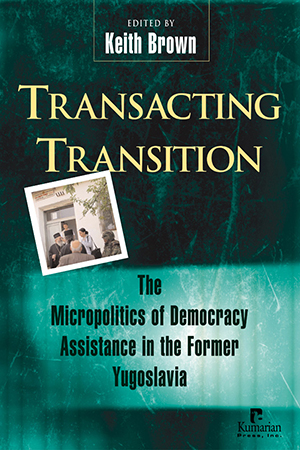
- 2006/245 pages
- Also of interest: Promoting Democracy in Postcommunist Ukraine by Kateryna Pishchikova and Evaluating Democracy Assistance by Krishna Kumar
- A Kumarian Press Book
Transacting Transition:
The Micropolitics of Democracy Assistance in the Former Yugoslavia
Paperback: $26.50
ISBN: 978-1-56549-222-6
Focusing on cases of international intervention in Kosovo, Serbia, and Macedonia, the authors of Transacting Transition explore how the mission and vision of "democracy promotion" is enacted on the ground—where principles of transparency, gender equality, and interethnic cooperation run up against the realities of political agendas, self-interest, and memories of conflict.







